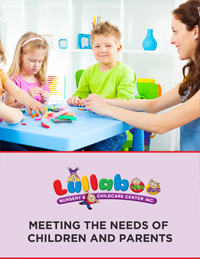Meeting the needs of children and parents
Written By: Emily Innes
Produced By: Tom Cunningham
Lullaboo Nursery and Childcare Center provides care for many children, but aims to provide an opportunity for each child to flourish in his or her own unique way while at the same time accommodating families’ needs.
Irini and Halim Mikhael were seeking childcare while pregnant with their first child, but were not satisfied with the service and quality offered at available child-care facilities. The couple solved their dilemma by building their own child-care centre in 2008 in Richmond Hill, Ont. After opening Lullaboo, Irini, who was a professional engineer for a multinational company, never returned to work.
With the birth of their second child, Halim, who was a professional accountant for IBM Canada, took paternity leave and the couple decided to open up a second Lullaboo location in Vaughan, Ont. with a capacity for 127 children, and a third in Mississauga, Ont., with a capacity for 179 children.
“Everything went well and I never went back after paternity leave and that created the two full-time directors that continue to operate (Lullaboo) right now,” said Halim, the CFO of Lullaboo Nursery and Childcare Center Inc. “We are up to five centres now and we have had another two children of our own— so four kids and five centres.”
Lullaboo also has a centre in Brampton, Ont., which cares for 120 children, and they are in the process of building another stand-alone Brampton facility that will have capacity for 235children. In January, they expanded their flagship Richmond Hill location and it can now accommodate 150 children.
Lullaboo is licensed by the Ontario Ministry of Education and they provide care for children from six weeks to 12 years of age. They offer full-time and part-time programs from 7 a.m.to 6:30 p.m.
Tested at home first
Their children – now ages one, two, four, and six – influence how the child-care centres are run, said Irini, the Director of Operations. “Definitely, everything we do, we keep our kids in mind. We will see how (our children) will interact with different materials and how they enjoy the different foods and snacks,” she said. “It also goes a long way to how we pick our staff. We judge our staff (by asking), ‘Would I be comfortable leaving my own child in this staff’s care?’”
Irini said the selection of the staff is one of the most crucial decisions they have to make to ensure the facilities are run with the utmost care. She highlighted this as one of the most challenging aspects of operating the company.
“Finding the right people that will help you along, finding the right fit that goes into each classroom, that still really keeps us awake at night,” said Irini. “In a service industry that is always going to be your number one priority, it is making sure that the ones delivering the services are adequately skilled and they understand your philosophy, they understand what you want to accomplish, and they understand how you want to deliver that service.”
Staff crucial to success
Halim noted that Lullaboo owes its success to their staff’s hard work. They currently employ around 100 people and that will be increased to about 150 employees when they open their next facility. “All of the support that we have really seen is from our staff, from the supervisors that we have trained and brought up. All of our supervisors worked in the classroom before they worked as supervisors and that support really brings us to where we are today.”
Lullaboo’s philosophy focuses on child development principles that centre on the concept of interaction and exploration during play as a natural way of learning. “As children interact with materials and their peers, they clarify and extend their understanding of the world. This also encourages children to become responsible, productive, problem-solving individuals, capable of independence and self-regulation,” states Lullaboo’s philosophy.
Professional service and communication
The company prides itself on professional service and a unique customer service approach. Lullaboo focuses on the whole family, acknowledging that the parents are the customers in terms of the transaction, but it is really about meeting the children’s needs for a sufficient learning environment.
“It is a very delicate balance,” said Halim. Because “the communication to the parents has to be seamless – it has to be open and direct . . . We strive to accommodate (the needs of the families) and we try to make sure that we are here to serve the families and to make days easier for them. They (should) not have to worry about us when they already have their careers to worry about.”
Halim said he does not focus on what his competitors are doing but instead takes time to focus on the feedback from his own family and from the other families they serve.
“That is where I see our competitive edge,” he said. “We talk to families and see what is missing and talk to families to find out what they would like to see done better . . . I will not use competition as a benchmark because you are just going to get caught up in who can beat who instead of getting new, fresh ideas and bringing innovation to the market.”
Lullaboo has developed an innovative technology to communicate daily with parents. Their electronic record provides parents with pictures and information about daily routines, and informs them if anything needs to be brought in the next day. They also have a phone system that parents can dial directly into their child’s classroom at any time of the day.
Lullaboo also has onsite, full-time cooks who prepare wholesome and nutritious meals and snacks for the children. Halim says he creates the menu himself, sources the ingredients, and tastes the new menus at home with his children before introducing them at Lullaboo. The children at the centres are all provided the same meals with subtle variations based on their dietary restrictions.
“If we have a vegetarian child, a kosher child, a halal child, and a child without a dietary restriction, then each and all have meatballs and mashed potatoes,” said Irini. “One of them will have veggie meatballs, one will have a halal meatballs, and one would have regular meatballs, yet they would not even notice. That inclusion and feeling part of the community, feeling part of their environment, really helps their confidence in the activities and you really see that in the confidence of the child because they do not feel left out.”
With a personal connection to The Hospital for Sick Children (Sick Kids) in Toronto, Lullaboo has been very charitable to the organization. They participate in the May and December charity campaigns for the hospital. During the month of May they promote giving 100 percent of the registration fees to Sick Kids and they also supplement this with community barbecue fundraisers. In December they sell a product to the families with a portion going to the fundraiser and then Lullaboo matches the earnings. Irini said that each centre has also adopted a child through World Vision. Lullaboo has donated over $30,000 to charities since its inception.
Lullaboo plans to keep growing with possible locations in Markham, Milton, Toronto, and Oakville, Ont. “There (will be) no more having our own kids, but probably more centres.”
More information can be found at lullaboo.ca.







